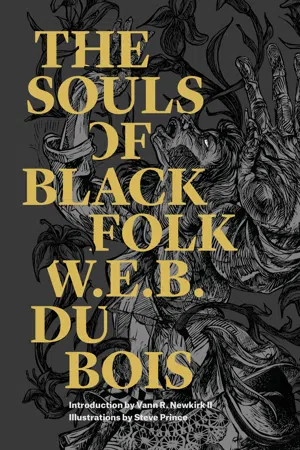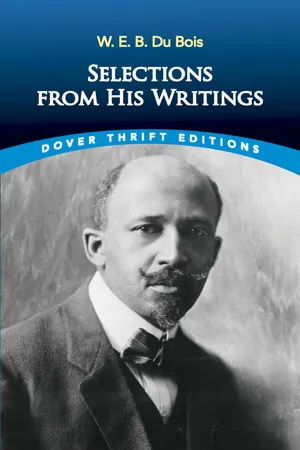Booker T Washington
Booker T. Washington was a prominent African American educator, author, and leader in the late 19th and early 20th centuries. He was the founder of the Tuskegee Institute, a historically black college in Alabama, and advocated for vocational education and economic self-reliance for African Americans. Washington's approach to racial progress, known as the Atlanta Compromise, emphasized education and economic advancement over political agitation.
6 Key excerpts on "Booker T Washington"
- eBook - ePub
- Gene Andrew Jarrett, Gene Andrew Jarrett(Authors)
- 2014(Publication Date)
- Wiley-Blackwell(Publisher)
...Booker T. Washington (1856–1915) When Booker T. Washington gave his famous speech before the Cotton States and International Exposition in Atlanta on September 18, 1895, he was immediately hailed as successor to Frederick Douglass, who coincidentally had passed away earlier that year. The principal and founder of the Tuskegee Normal and Industrial Institute, Washington was the most innovative African American educator and successful politician of his time, and Tuskegee was the most famous African American institution in the United States. As the first African American to eat dinner with the President of the United States at the White House, Washington espoused the conservative rhetoric that, for African Americans, thrift, hard work, and social usefulness were more important than political agitation for racial equality. Founding the National Negro Business League in 1900, he won the admiration and gratitude of African American entrepreneurs long excluded from predominantly white business organizations. Yet, as W.E.B. Du Bois had pointed out, Booker T. Washington’s “paradox” lay in his position as a servant of two opposing constituencies: recently emancipated southern African Americans, and the moneyed white establishment that sought their continued subjugation. Doomed to juggle the demands of these two constituencies, Washington struck compromises that were controversial, if not contentious, given the egalitarian promises of Reconstruction. Booker Taliafarro Washington was born a slave in southwestern Virginia five years before the Civil War. His mother was an enslaved woman named Jane Ferguson, who took her children to West Virginia to reunite with her husband, Washington Ferguson, after the war ended. Although his biological father was a white man, probably his mother’s master, Washington took his stepfather’s first name as his own...
- eBook - ePub
Black Leaders and Ideologies in the South
Resistance and Non-Violence
- Preston King, Walter Earl Fluker, Preston King, Walter Earl Fluker(Authors)
- 2013(Publication Date)
- Routledge(Publisher)
...3 Booker T. Washington: ‘We Wear the Mask’ NORMAN E. HODGES The Atlanta Exposition Address With the death of Frederick Douglass, Booker Taliaferro Washington (1856–1915) filled a vacuum in African-American leadership. Washington acquired power and prestige that far exceeded that enjoyed by any of his predecessors, including Douglass (Harlan 1972: preface). If we follow W.E.B. Du Bois (1994: 26), Washington was ‘the most distinguished Southerner since Jefferson Davis, and the one with the largest personal following’. Although Washington rode the crest of a surging wave of acclaim, his success, nonetheless, may occasion surprise. In 1895, as head of Tuskegee Institute, Washington was but a rural Alabama educator. If at 39 he was not (by the standards of the time) particularly young, he was still pretty obscure. If by 1895 Tuskegee had made significant strides since Washington took it over in 1881, it was still a modest secondary industrial and normal school. All the same, from this backwater, and somehow out of the blue, the Tuskegee principal unexpectedly and improbably emerged onto the national scene as stellar leader of his race, pre-eminent ‘Negro of the Hour’, the national ‘Negro’ spokesman. Whether Washington's success is better explained by white promotion or black enthusiasm or both is a matter to which we return. The immediate consideration is that Washington enjoyed a remarkable triumph. From 1895 to his death, no other African American, and relatively few whites, scaled such heights as he. ‘The Tuskegee Wizard’, as Washington was sometimes called, both by friends and critics, leapt to the attention of the nation in a manner nearly magical. The instrument enabling his elevation was a pithy, commanding speech delivered at the Cotton States and International Exposition in Atlanta on 18 September 1895. That address was perhaps the most famous ever given in the South. Washington had spoken on a theme and in a manner that roused and deeply moved his audience...
- eBook - ePub
- W.E.B. Du Bois(Author)
- 2019(Publication Date)
- G&D Media(Publisher)
...But he passed away in his prime. Then came the new leader. Nearly all the former ones had become leaders by the silent suffrage of their fellows, had sought to lead their own people alone, and were usually, save Douglass, little known outside their race. But Booker T. Washington arose as essentially the leader not of one race but of two—a compromiser between the South, the North, and the Negro. Naturally the Negroes resented, at first bitterly, signs of compromise which surrendered their civil and political rights, even though this was to be exchanged for larger chances of economic development. The rich and dominating North, however, was not only weary of the race problem, but was investing largely in Southern enterprises, and welcomed any method of peaceful cooperation. Thus, by national opinion, the Negroes began to recognize Mr. Washington’s leadership; and the voice of criticism was hushed. Mr. Washington represents in Negro thought the old attitude of adjustment and submission; but adjustment at such a peculiar time as to make his programme unique. This is an age of unusual economic development, and Mr. Washington’s programme naturally takes an economic cast, becoming a gospel of Work and Money to such an extent as apparently almost completely to overshadow the higher aims of life. Moreover, this is an age when the more advanced races are coming in closer contact with the less developed races, and the race-feeling is therefore intensified; and Mr. Washington’s programme practically accepts the alleged inferiority of the Negro races. Again, in our own land, the reaction from the sentiment of war time has given impetus to race-prejudice against Negroes, and Mr. Washington withdraws many of the high demands of Negroes as men and American citizens. In other periods of intensified prejudice all the Negro’s tendency to self-assertion has been called forth; at this period a policy of submission is advocated...
- eBook - ePub
- W. E. B. Du Bois, Manning Marable(Authors)
- 2015(Publication Date)
- Routledge(Publisher)
...But Booker T. Washington arose as essentially the leader not of one race but of two,—a compromiser between the South, the North, and the Negro. Naturally the Negroes resented, at first bitterly, signs of compromise which surrendered their civil and political rights, even though this was to be exchanged for larger chances of economic development. The rich and dominating North, however, was not only weary of the race problem, but was investing largely in Southern enterprises, and welcomed any method of peaceful cooperation. Thus, by national opinion, the Negroes began to recognize Mr. Washington’s leadership; and the voice of criticism was hushed. Mr. Washington represents in Negro thought the old attitude of adjustment and submission; but adjustment at such a peculiar time as to make his programme unique. This is an age of unusual economic development, and Mr. Washington’s programme naturally takes an economic cast, becoming a gospel of Work and Money to such an extent as apparently almost completely to overshadow the higher aims of life. Moreover, this is an age when the more advanced races are coming in closer contact with the less developed races, and the race-feeling is therefore intensified; and Mr. Washington’s programme practically accepts the alleged inferiority of the Negro races. Again, in our own land, the reaction from the sentiment of wartime has given impetus to race prejudice against Negroes, and Mr. Washington withdraws many of the high demands of Negroes as men and American citizens. In other periods of intensified prejudice all the Negro’s tendency to self-assertion has been called forth; at this period a policy of submission is advocated...
- eBook - ePub
- W. E. B. Du Bois, Steve Prince(Authors)
- 2017(Publication Date)
- Restless Books(Publisher)
...But Booker T. Washington arose as essentially the leader not of one race but of two,—a compromiser between the South, the North, and the Negro. Naturally the Negroes resented, at first bitterly, signs of compromise which surrendered their civil and political rights, even though this was to be exchanged for larger chances of economic development. The rich and dominating North, however, was not only weary of the race problem, but was investing largely in Southern enterprises, and welcomed any method of peaceful cooperation. Thus, by national opinion, the Negroes began to recognize Mr. Washington’s leadership; and the voice of criticism was hushed. Mr. Washington represents in Negro thought the old attitude of adjustment and submission; but adjustment at such a peculiar time as to make his programme unique. This is an age of unusual economic development, and Mr. Washington’s programme naturally takes an economic cast, becoming a gospel of Work and Money to such an extent as apparently almost completely to overshadow the higher aims of life. Moreover, this is an age when the more advanced races are coming in closer contact with the less developed races, and the race-feeling is therefore intensified; and Mr. Washington’s programme practically accepts the alleged inferiority of the Negro races. Again, in our own land, the reaction from the sentiment of war time has given impetus to race-prejudice against Negroes, and Mr. Washington withdraws many of the high demands of Negroes as men and American citizens. In other periods of intensified prejudice all the Negro’s tendency to self-assertion has been called forth; at this period a policy of submission is advocated...
- eBook - ePub
- W.E.B. Du Bois, Bob Blaisdell(Authors)
- 2013(Publication Date)
- Dover Publications(Publisher)
...Washington’s mistakes and short comings: he never adequately grasped the growing bond of politics and industry; he did not understand the deeper foundations of human training and his basis of better understanding between white and black was founded on caste. We may then generously and with deep earnestness lay on the grave of Booker T. Washington testimony of our thankfulness for his undoubted help in the accumulation of Negro land and property, his establishment of Tuskegee and spreading of industrial education and his compelling of the white South to at least think of the Negro as a possible man. On the other hand, in stern justice, we must lay on the soul of this man, a heavy responsibility for the consummation of Negro disfranchisement, the decline of the Negro college and public school and the firmer establishment of color caste in this land. What is done is done. This is no fit time for recrimination or complaint. Gravely and with bowed head let us receive what this great figure gave of good, silently rejecting all else. Firmly and unfalteringly let the Negro race in America, in bleeding Hayti and throughout the world close ranks and march steadily on, determined as never before to work and save and endure, but never to swerve from their great goal: the right to vote, the right to know, and the right to stand as men among men throughout the world. It is rumored that Mr. Washington’s successor at Tuskegee will be Robert Russa Moton, 1 Commandant of Cadets at Hampton. If this proves true Major Moton will enter on his new duties with the sympathy and good will of his many friends both black and white. S OURCE : The Crisis. Volume 11, Number 2. December 1915. 1 The educator Robert Russa Moton (1867–1940) was in fact Washington’s successor and served at Tuskegee until 1935. Du Bois’s good will toward Moton quickly dissipated....





